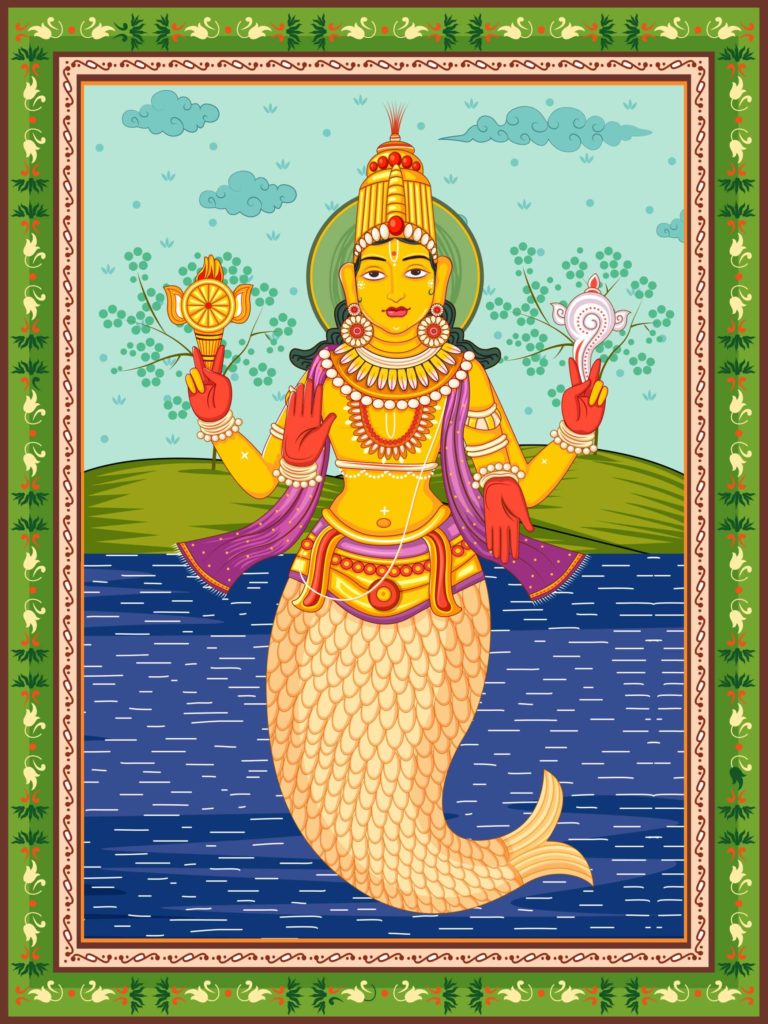
Flood stories are found in cultures all over the world. You may have heard of flood tales from the Torah and the Epic of Gilgamesh, but did you know that Hinduism has its own flood narrative? Like many other flood myths, this one features a divine being, Matsya, who helps humanity survive the rising waters. Who composes its cast of characters, and how does humankind outlast the flood? Strap in for a fascinating story and some revealing details behind the scenes.
How Kindness Rescued the Human Race
Scientists are still trying to understand altruism’s role in human evolution. But the story of Manu demonstrates how it ensured humanity’s survival. As a legendary figure in Hinduism, Manu was both the first man and the first king. The Encyclopedia Britannica reveals that he appears in many ancient Hindu texts: the Vedas, Puranas, Mahabharata, and the Satapatha Brahmana.
One early version of Manu’s flood story appears in the first book and eighth chapter of the Satapatha Brahmana. According to this tale, a small fish pleads to Manu for help and warns him of an impending flood. Manu saves the fish from being eaten by larger fish, then agrees to rear it until it’s fully grown. Once the fish has grown to a tremendous size, it instructs Manu to build a large boat. When the boat is complete, Manu attaches it to the fish’s horn by a rope. As the waters rise, the fish pulls Manu to an exposed mountaintop where he can rest.
Blogger Sandeep Kumar Sood points out how Manu upends the “law of the jungle” by saving the small fish. Sood adds that Manu’s kindness may stand for order prevailing against primal chaos. Of course, Manu wasn’t just rewarded for the act by his own survival. After the boat rests on the mountain, he offered butter and sour milk sacrifices by pouring them into the waters. One year later, a woman emerges from the waters and explains that his oblations created her. From these two, the human race grows and replenishes the earth.
Who Was That Mysterious Fish?
Manu’s fish seems like a mystical creature, but is there more to the story? Sacred Hindu texts seem to disagree on the fish’s identity. The Mahabharata and several Puranas claim that the fish was Matsya, Vishnu’s first avatar. The Ancient History Encyclopedia mentions that Matsya the fish, Kurma the tortoise, and Varaha the boar were Vishnu’s avatars during this world’s initial creation stage. Followers of Vaishnavism believe that Vishnu is the supreme deity of the universe. His manifestation as Matsya fits a distinct pattern: coming to humanity’s aid when the cosmic order is threatened.
The Encyclopedia Britannica also mentions early accounts that equate Matsya with Prajapati. He’s a supreme creator deity depicted in several classical Hindu texts. Some claim that he’s really Brahma, but depending on which one you read, he could be Vishnu, Shiva, or another significant god. Another excerpt from the Satapatha Brahmana depicts Prajapati speaking the world into existence. Curiously, the passage shares some striking similarities to the creation myth in Genesis. The writer even declares in the first verse that “in the beginning this [universe] was water, nothing but a sea of water.”
A Collection of Human Memories
PBS’s Myths and Heroes series reminds us that myths aren’t always far-fetched fanciful tales. Some may have sprung from factual events in humanity’s past, far before our ancestors inscribed letters into clay tablets. Flood mythology is broad and complex, encompassing hundreds of stories. There’s geological and archaeological evidence of floods at different times in history: rivers overflowing in the Middle East, glaciers melting in the Americas, and tsunamis in other areas. We may never know fact from fiction in these myths, but they still offer valuable lessons today.

